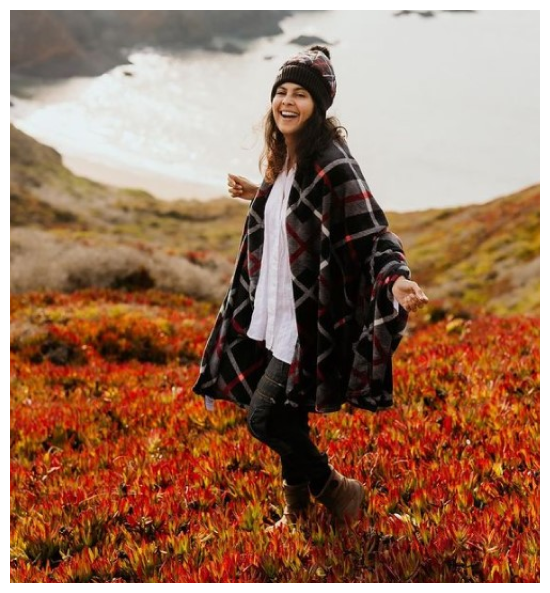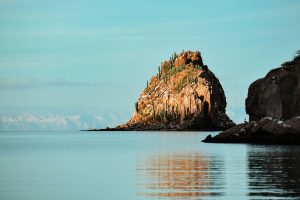When it comes to hiking, one of the most crucial pieces of gear is a good pair of hiking boots, otherwise you’re not going to enjoy your hike very much and you’ll probably think twice before agreeing to a hike again! I say this from experience. When I first started hiking, I had the wrong shoes. My toes would pinch or hit against the front of my boots on downhill treks and I’d finish the hike in pain. Sound familiar?!
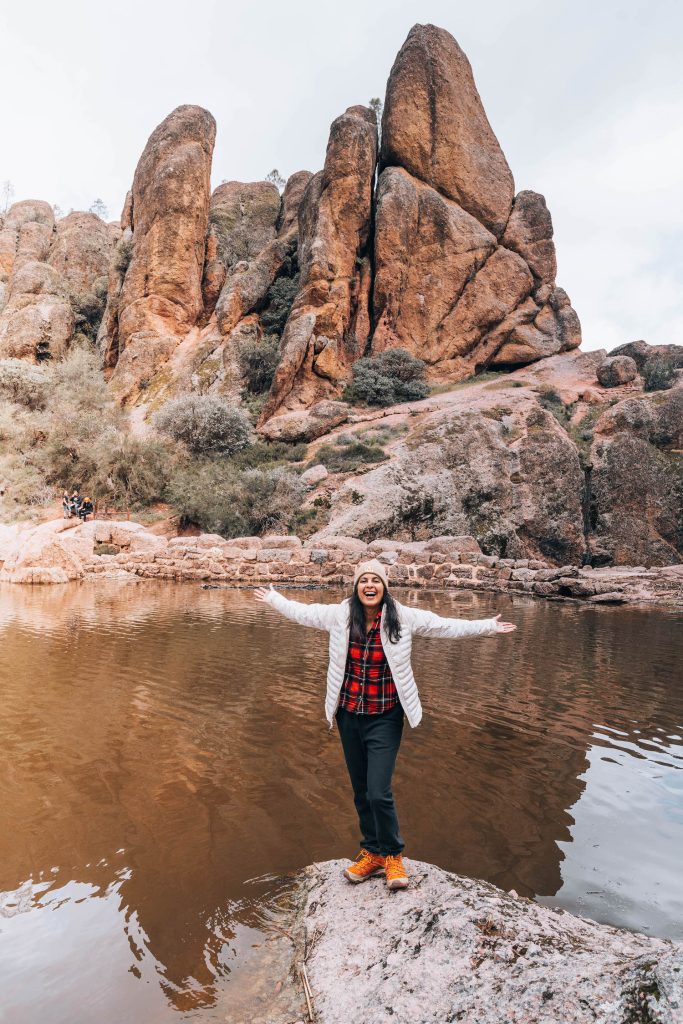
So if you want to enjoy the hike, and immerse in nature, and you don’t want to be worrying about aches and pains caused by the shoes, you need to know how to choose the right boots for you. The best hiking boots provide support, protection, and comfort, allowing you to attempt any trail with confidence. But let’s face it, there are too many options available on the market, and choosing the perfect pair can be confusing. In this comprehensive guide on how to choose hiking boots, I will walk you through the process of selecting the best hiking boots, including a comparison between hiking boots and trail runners, considerations for different terrains, and an exploration of the popular Merrell boot range and why I chose Merrell.
Hiking Boots vs. Trail Runners
When you’re choosing hiking boots, one of the first decisions you’ll face when choosing footwear for hiking is whether to opt for traditional hiking boots or lightweight trail runners. Both have their advantages, and the choice largely depends on the type of hiking you plan to do.
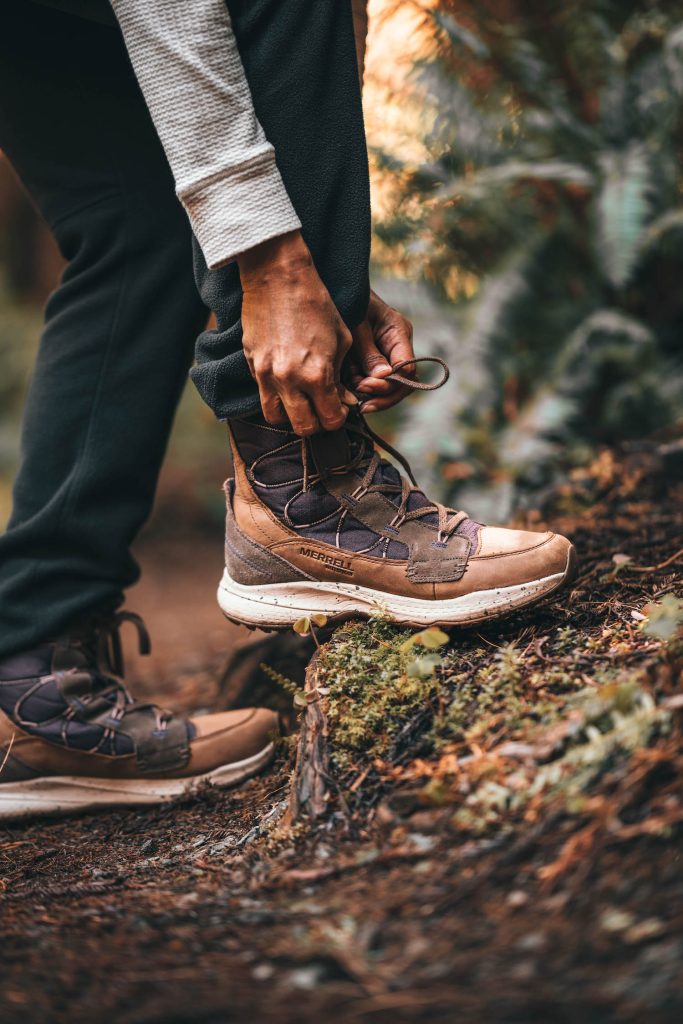
Hiking Boots
My Story
Late 2021, I experienced an unusually severe pain (like nothing I had every felt) in my lower back region of my spine on my way to a travel assignment in Florida and again on a flight back from my Iceland trip. My MRI showed a disc herniation in my L4/L5 area of my spine which is essentially in the lower back region. The L4-L5 spinal segment consists of the two lowest vertebrae in the lumbar spine. It provides motion in many directions and supports the upper torso.
Disc Herniation
Apparently, the L4 and L5 undergo heavy impact with day-to-day motions and are highly flexible. What the doctors told me was that everyone’s back is degenerating to some extent as we age. Some of us have symptoms and others might never feel symptoms. Well for me, the symptoms began with that strange, intense lower back pain, and after that pain dissipated in the initial weeks since it began, I got Sciatica on my left leg on my flight to Hawaii for New Year’s Eve. And I spent the rest of my Hawaii trip in abject misery, finding it excruciating to sit, walk, or even lie down. I came back to California and went to physical therapy in January 2022. But by February 5th, my nerves became so impinged from the herniation, that I woke up one morning unable to walk. I couldn’t get out of bed. Fast forward to present day, July 2023 where I’m obviously not only walking, but hiking again yay! My last hike was a round trip 9mi hike with an elevation gain of 3,000 feet in Yosemite National Park.
Why I Wear Hiking Boots
For me, the right shoes are critical now, as I recover and get back to being able to hike the way I used to. The best hiking boots excel in providing ankle support, stability, and protection against rough terrain. They are particularly recommended for long hikes or backpacking trips, where carrying heavier loads requires added support. Additionally, hiking boots often have stiffer soles, making them more suitable for rocky or uneven terrains. I remember during my recovery, my doctors saying, “Don’t sit cross legged, don’t round your back to bend down, don’t lift heavy things, and don’t fall.” And that’s where hiking boots with good traction come in.
Trail Runners
On the other hand, trail runners are great for those who want to do fast-paced, agile hiking on well-maintained trails. Trail runners are lightweight and flexible, allowing for improved agility and natural foot movement. Trail runners are often more breathable and dry quicker, making them a popular choice for warm weather hikes or crossing water bodies.
What Features to Look for in Hiking Boots:
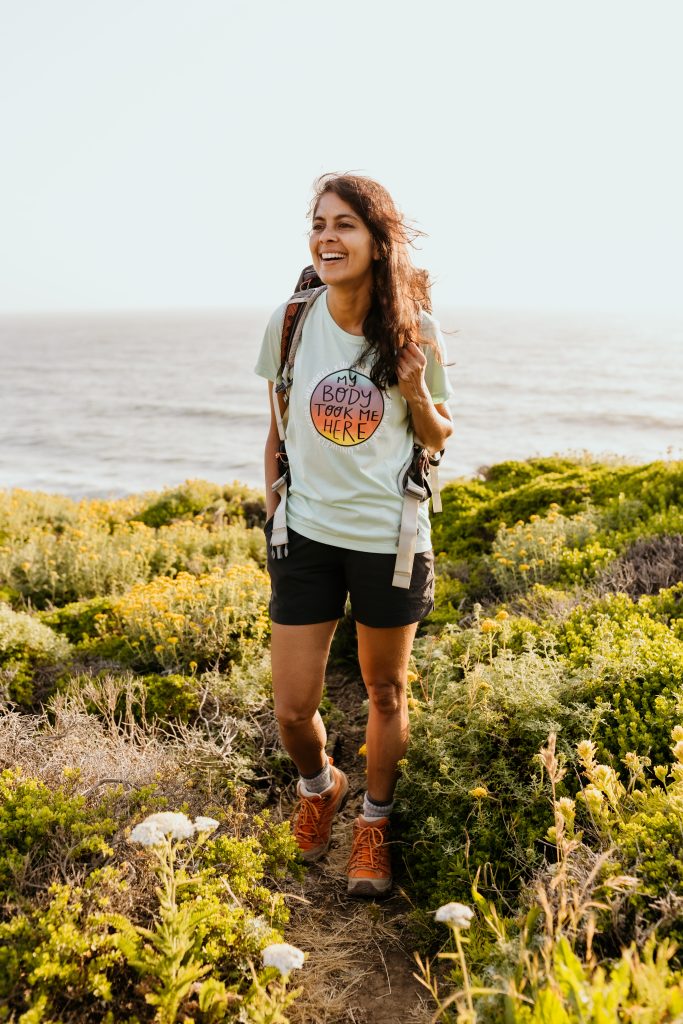
The best hiking boots have a range of properties and features that contribute to their performance and comfort on the trail. Here are some key properties to look for when selecting hiking boots:
- Durability: Buying hiking boots that are constructed with high-quality materials that can withstand the rigors of the trail is important. Look for boots made from materials that are resistant to abrasion and wear.
- Ankle Support: Hiking boots provide crucial ankle support, especially on uneven terrain. Look for boots with mid or high-cut designs that offer stability and prevent ankle rolls or sprains.
- Waterproofing: Many hiking boots come with waterproof or water-resistant features to keep your feet dry in wet conditions. Look for boots with waterproof membranes such as Gore-Tex that allow breathability while keeping water out.
- Traction: A good hiking boot should have a sturdy outsole with deep lugs or aggressive tread patterns. This ensures excellent traction and grip on various surfaces, including rocks, mud, or slippery terrain.
- Cushioning and Comfort: Look for boots with adequate cushioning in the midsole to provide comfort and shock absorption, reducing foot fatigue. Features like EVA (ethylene-vinyl acetate) or foam padding enhance comfort during long hikes.
- Breathability: Hiking boots should allow proper airflow to keep your feet cool and dry. Look for boots with breathable linings or mesh panels that prevent excessive sweating and help regulate temperature.
- Toe Protection: The toe area of hiking boots should have a protective cap or reinforcement to guard against accidental impacts with rocks or debris, reducing the risk of injury.
- Weight: Consider the weight of the hiking boots, as lighter options can provide greater agility and reduce fatigue during long hikes or multi-day trips. However, ensure that lightweight boots still offer the necessary support and durability for backpacking trips.
- Fit and Adjustability: Proper fit is crucial when buying hiking boots. Look for boots with a snug fit that provides enough room for toe movement and prevents blisters. Boots with lacing systems, such as speed laces or eyelets, allow for easy adjustability and a personalized fit.
- Arch and Anatomical Support: Buying hiking boots offer additional features like arch support or anatomically contoured footbeds is an important consideration. These features enhance comfort and provide better alignment and stability for your feet.
How to Choose Hiking Boots for Different Terrains
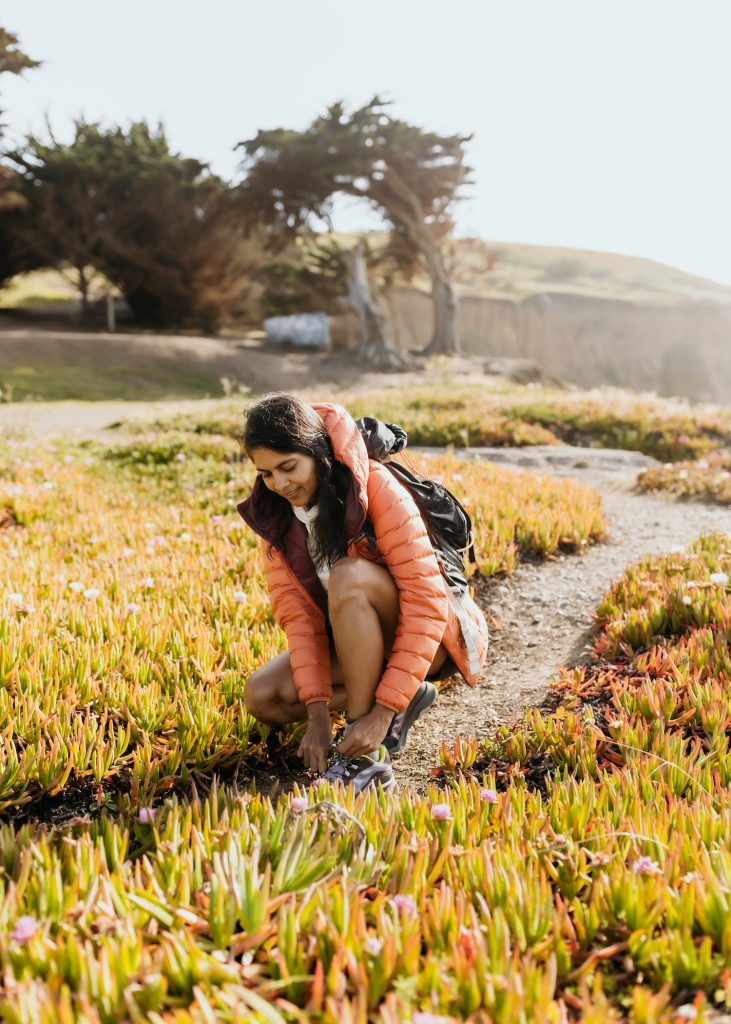
Buying hiking boots for specific terrains is essential for a comfortable and enjoyable hiking experience. Here are some considerations to keep in mind:
- Day Hikes and Easy Trails: For day hikes or well-groomed trails, I like to wear lightweight hiking boots. Even trail runners can be sufficient. Look for breathable materials, adequate cushioning, and a flexible sole for optimum comfort.
- Rugged and Rocky Terrains: If you know your hike is going to go through rough or rocky terrains, opt for mid or high-cut hiking boots that offer ankle support and protection. If you sign up for an app like AllTrails, you can get an idea of trail terrain from the description and from other hikers who have reviewed the trail. Look for sturdy outsoles with deep lugs for excellent traction and a durable upper that can withstand abrasion.
- Wet and Muddy Conditions: In wet or muddy environments, buying waterproof boots are crucial to keep your feet dry. There’s nothing worse than having wet feet/socks during the hike. Look for boots with a breathable waterproof membrane such as Gore-Tex, paired with a durable outsole that offers excellent grip on slippery surfaces.
- Winter Hiking: For snowy or icy conditions, consider buying insulated hiking boots with a thick outsole designed for traction on slippery surfaces. Insulation materials like Thinsulate or PrimaLoft will keep your feet warm and comfortable.
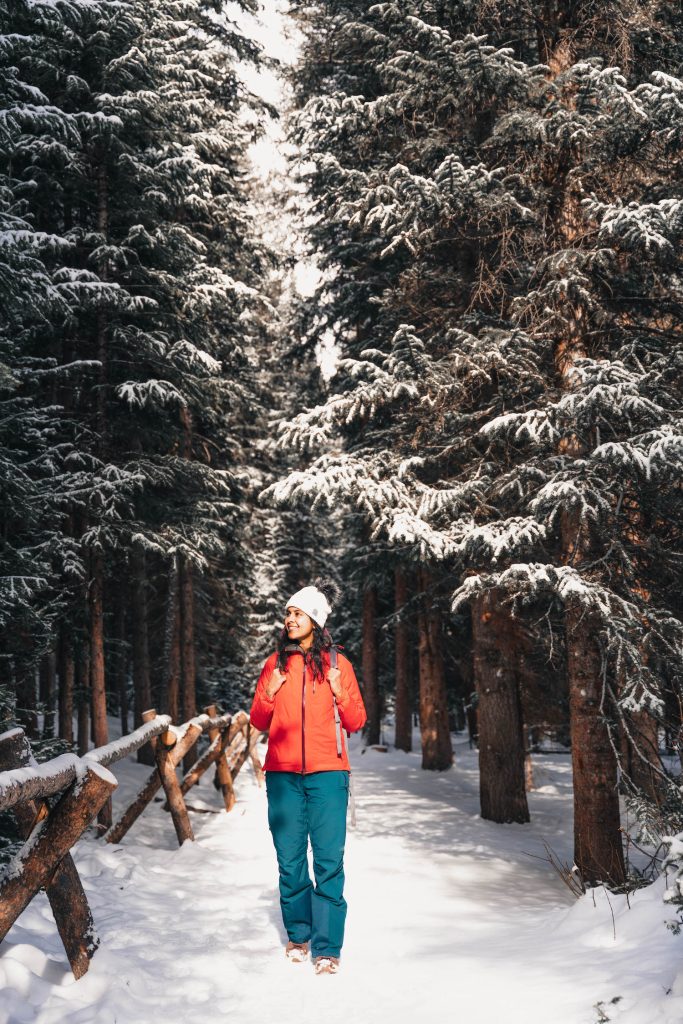
Exploring Merrell Hiking Boots
Merrell has been around for 42 years and is a renowned brand that offers a wide range of hiking boots suitable for various terrains and preferences. Their mission is to “share the simple power of being outside” and they believe that the trail is for everyone, which is something very near and dear to my heart as someone championing for more diversity/equity in the outdoors. I started wearing Merrell in my 20’s as a walking shoe for my international travels. Even then they were known to be some of the best walking shoes in the outdoors industry. I then tried their waterproof boots for international travel. And both the pairs I had bought kept me dry during rainy days in Europe. I was a fan. The comfort was terrific and I could walk for hours sightseeing.
When I began hiking, I experimented with a range of hiking boots from Vasque to Oboz, to the North Face to Columbia Sportswear to Danner boots to L.L.Bean and finally to Merrell. Vasque and Oboz both felt like serious hiking boots but both are slightly on the heavier side and after a day of hiking, you can’t wait to take them off. Merrell hiking boots on the other hand are light, yet come equipped with great traction and support. Here is a review of some of my favorite Merrell hiking boots:
| Shoe Name | Made For | Trail Type | Weight per Shoe | Lug | Drop |
| Merrell Moab 3 Mid Waterproof (Gore-Tex) | Hiking | Rugged | 16.36oz | 5mm | 11.5mm |
| Merrell Moab 3 (Waterproof & non Waterproof available) | Hiking | Rugged | 15.97oz | 5mm | 11.5mm |
| Merrell Bravada 2 Thermo Mid (Waterproof and non Waterproof available) | Hiking | Light/Winter | 12.41oz | 4mm | 8mm |
| Merrell Moab Speed | Hiking | Moderate | 11.28oz | 4mm | 10mm |
| Merrell Rogue Hiker Mid Goretex | Hiking | Rugged | 14.5oz | 5mm | 8mm |
- Merrell Moab 3 Mid Waterproof: These are the best Merrell hiking boots with regards to stability and traction. It’s designed for ANY terrain and has exceptional waterproofing. I hiked for 2 hours in a thunderstorm in Yosemite and my feet remained dry at the end of the hike. It also offers mid-height design for additional ankle support on rugged trails.
- Merrell Moab 3 : You can choose the waterproof or non waterproof option. The main difference between this and the Moab 3 Mid is the height design for ankle support. These boots don’t have the higher ankle support feature but offer similar traction, maximum shock absorption, protective rubber heel and toe cap, and is very eco-friendly with 100% recycled laces, webbing and mesh lining.
- Merrell Bravada 2 Thermo Mid Waterproof: You can also order the non waterproof version and these boots have an insulation rating of warm which are great for light hiking trails in winter. It offers the Merrell Quantum Grip durable rubber outsole that gives you confidence to take a walk on those snowy trails. The Mid indicates the mid-height design for additional ankle support.
- Merrell Moab Speed: These boots are great for lighter trails and offer 3 key features: The Vibram® Ecostep Recycle outsole designed with 30% recycled rubber for better traction come rain or shine, FloatPro™ Foam midsole for lightweight comfort (sometimes we just want something light on our feet), and Vibram® Traction Lugs for a stronger grip on tough gravel. This is also an eco-friendly pair of boots with 100% recycled laces, webbing, mesh lining, and footbed cover.
- Merrell Rogue Hiker Mid Goretex: If you’re getting ready to backpack, then this is your lightweight backpacking boot! This is a serious hiking boot built for some serious hikes. It’s got GORE-TEX waterproofing, best-in-class traction and is great for backcountry trail. Some of the key features include: Bellows gusset integrated with hybrid midfoot bootie construction to keep out debris, Rock plate in running inspired S-Curve geometry for added stiffness and stability in pack hiking applications, Vibram® MegaGrip® high performance rubber outsole for unparalleled grip on both dry and wet surfaces and of course the Vibram® traction lugs specifically designed to increase traction and shed debris with each step.
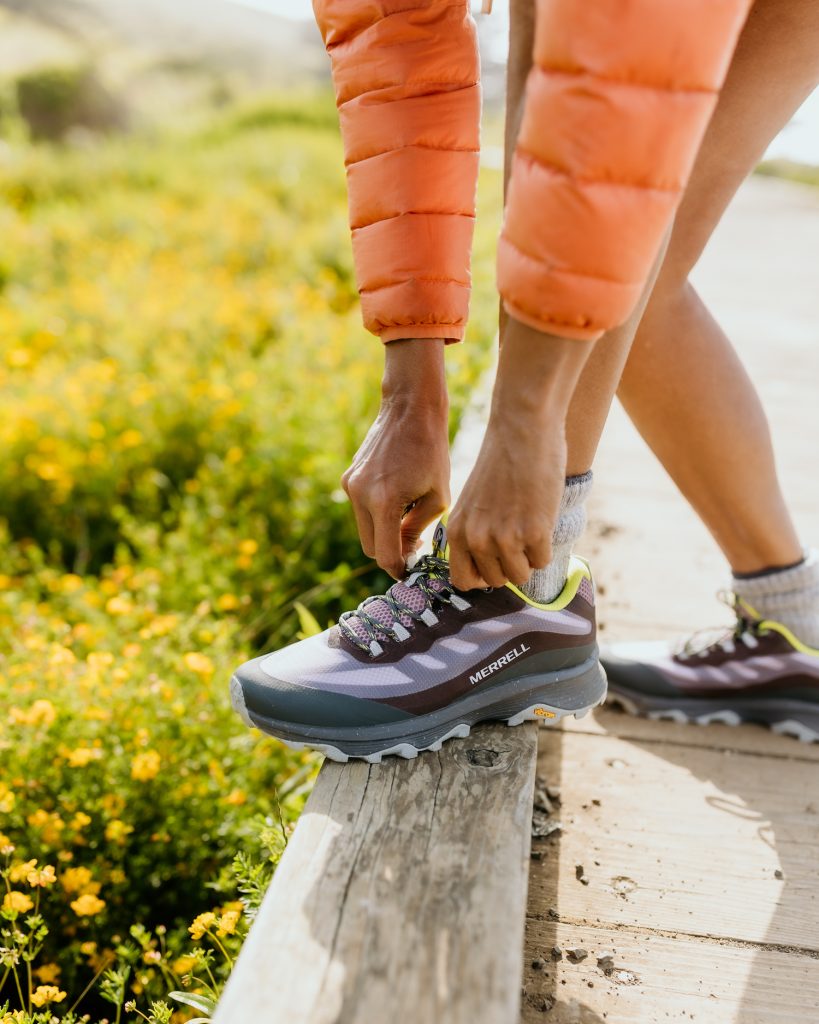


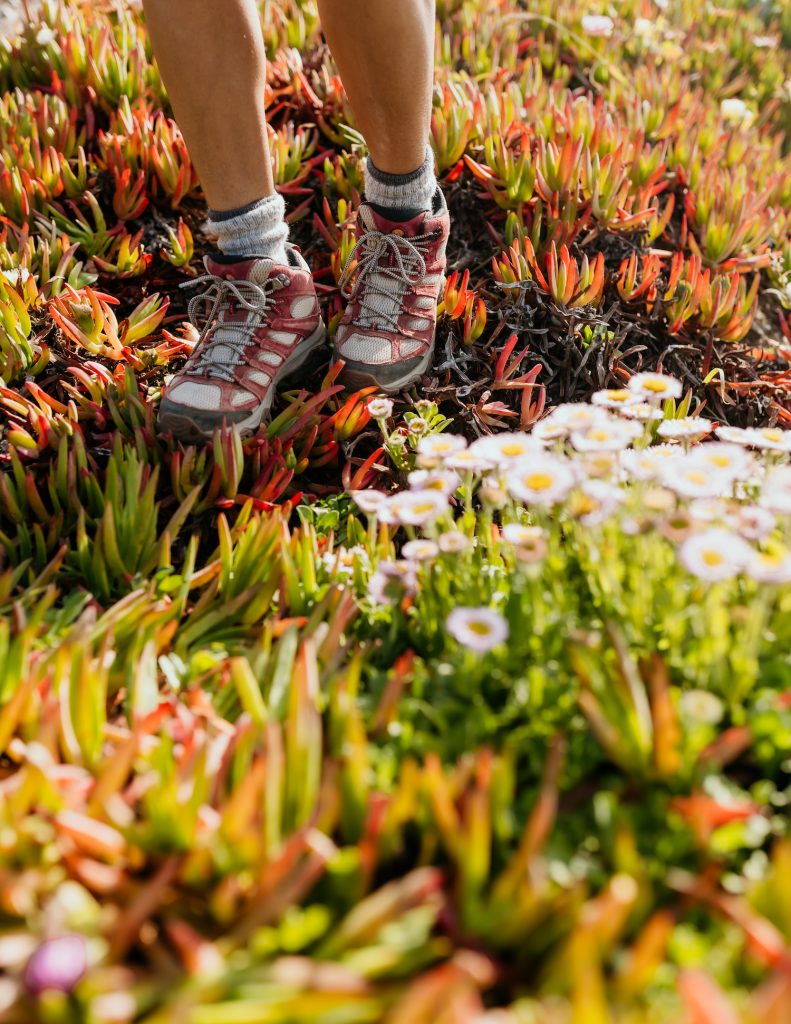
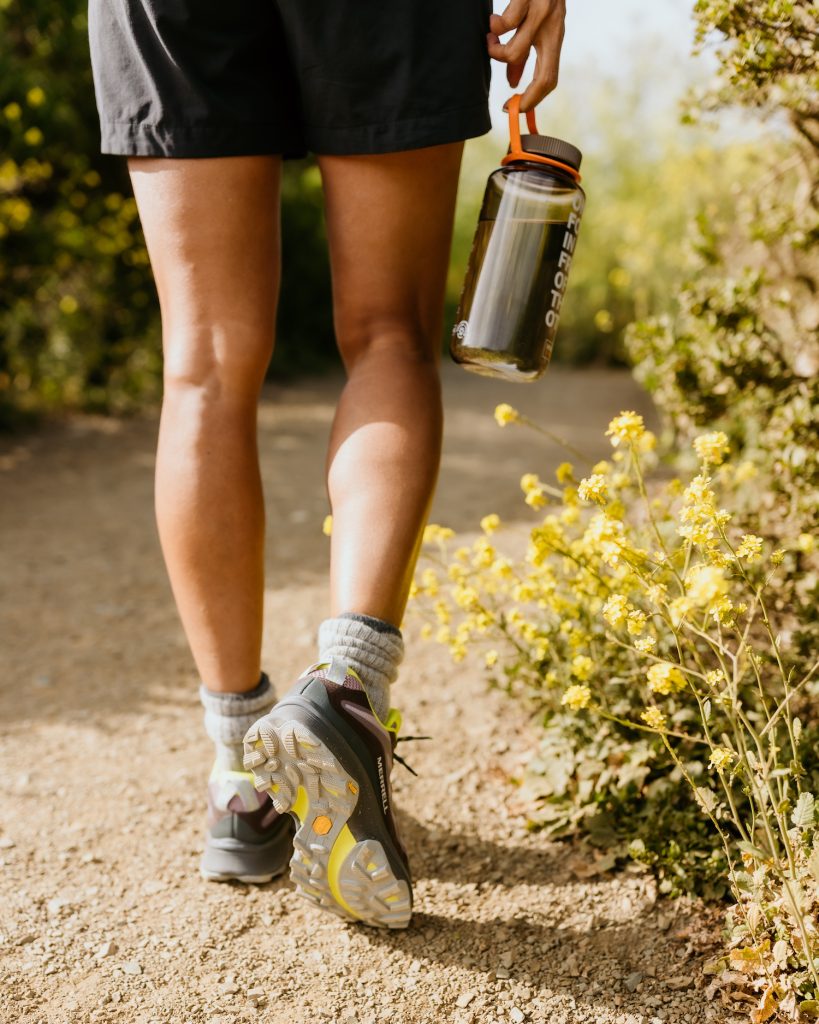
Summer Sandals
If you’re camping or backpacking (and want a comfy pair of sandals at the campsite) or even if you are just going for a walk outside/walking during your travels and need good footwear, I would recommend the Merrell summer sandals that are on sale right now.
- The Merrell Speed Fusion Strap: This is my ultimate favorite sandal from Merrell right now! I can go from a light trail to lunch! The Vibram® EcoStep underfoot, the FloatPro™ foam and Lycra® lining helps keep my feet comfortable all day, which is important when recovering from a back injury like mine. The hook and loop closure system allows you to quickly adjust this hiking sandal to the contours of your feet and it’s sooo comfy to walk in, I am loving this! Oh and the Vibram® Ecostep Recycle outsole designed with 30% recycled rubber provides added durability and
improved grip on wet and dry surfaces. - Terran 3 Cush Lattice: I’m also really liking this sandal, it’s super light and comfy thanks to the COMFORTBASE™ ACTIVE contoured insole for all day comfort. Hook and loop closure for quick adjustability or slip-on options available and I find this perfect for city walking or lighter trails. One additional cool feature in this sandal is the Cleansport NXT™ treated for natural odor control, and the lightweight EVA foam midsole which is what provides stability and comfort.
Conclusion
So there you have it, a comprehensive guide to choosing the best hiking boots and walking sandals, why I love Merrell and the different types of Merrell boots depending on the hiking terrain. If you’re looking to get your own pair of Merrell boots, I’ve got you covered with a discount code! Just use this at checkout and save some money! Discount code: MHC_TRAILBLAZER20_Preethi. If you have any questions or any feedback on Merrell boots you’ve tried, please let me know! I look forward to hearing from you!
